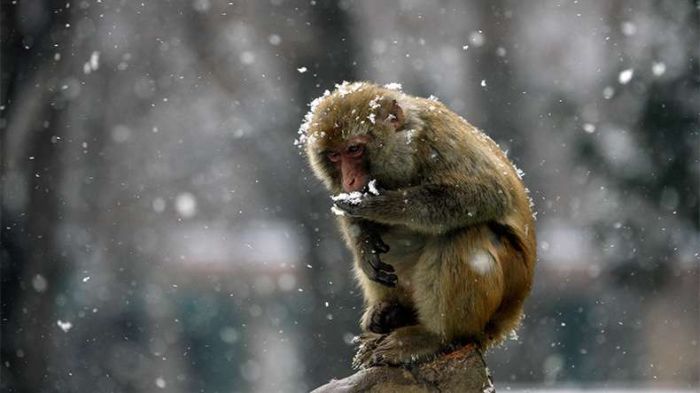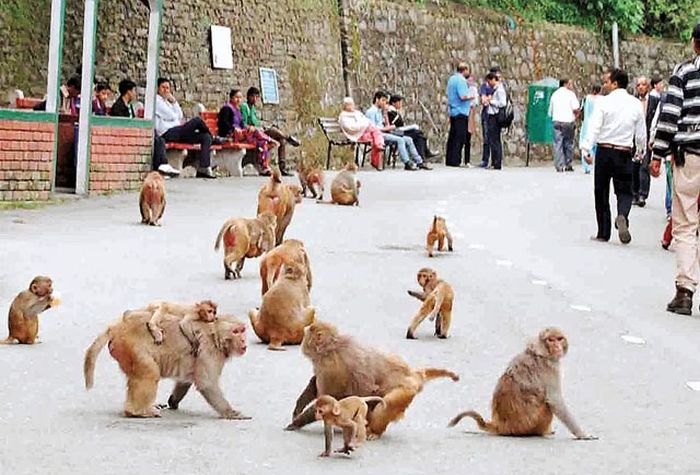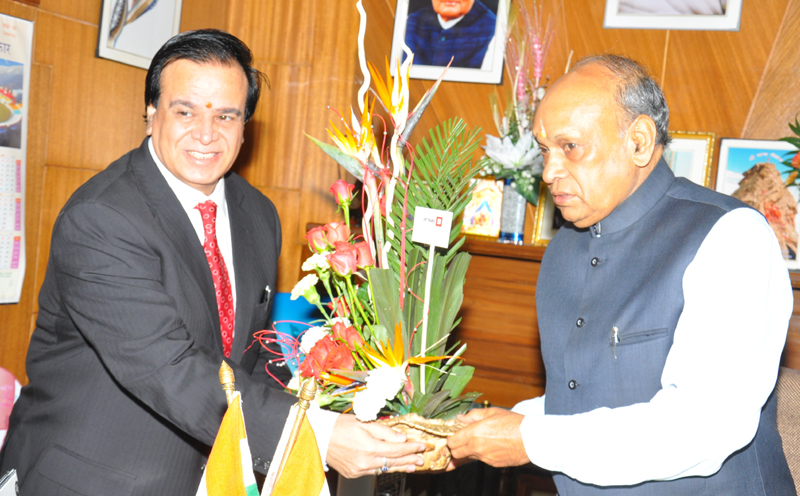I am positively appalled at the prospect that monkeys can now be shot in Shimla, consequent upon their being declared vermin by the central Ministry of Environment and Forests. We must not forget that monkeys are the original residents of this city and came here long before the Captain Kennedy’s, Negis and Soods: in fact the last two have taken over the government and business, respectively, in an embrace much tighter than what the poor simians exercise over Jakhoo hill.
In fact, it is my belief (based on brahmanical intuition, and not on any empirical evidence) that it is on the famous Ridge that a stout alpha male got up on his hind legs one fine morning to have a better look at the alpha female and thereby evolved into “homo erectus” (not to be confused with the then Maharaja of Patiala who did something similar vis-a-vis an English lady and was exiled to Chail). Further evolution took place when the government shifted to Shimla in the summers and when HP became a full state: these produced the “homo prostratus”, most of whom are to be found in the civil services; the “homo corruptus”. who have a natural attraction for politics; and the ” homo OROPus” who wear smart uniforms and play golf the whole day. The point I’m trying to make, dear readers, is that there are many subspecies of the rhesus monkey in Shimla, so why pick only on the ones who have refused to evolve?
Some years ago the Forest Deptt. decided to adopt an Air-B+B or YOYO Rooms approach to the problem of the apes targeting women’s handbags at Jakhoo ( incidentally, it is only the more evolved and stupid species that target the women themselves and not the handbags): they caught them by the dozen in Shimla and let them loose in the Tara Devi forests, where they were fed fruits, vegetables and the occasional Baljee’s hamburger. It was observed, however, that over a period of time the forest officials developed healthy paunches and jowels; the monkeys themselves usually caught the evening bus from Kaithlighat and returned to their favourite haunts in the town! Very soon this experiment was dropped and the forests of Tara Devi returned to their rightful occupiers- the poachers and the timber smugglers.
Next, the Department started a mass sterilisation programme but, mindful of what had happened during Sanjay Gandhi’s time, it did not sterilise the babies, the pregnant, or even the dead monkeys, and made no distinctions based on caste, religion or economic status. But it soon ran into an unexpected problem: the monkeys quickly started recognising the DFO or the Ranger who came to trap them, something which even the Forest Minister or I, as Secretary, could not do. They even recognised the numbers of their official vehicles! One knowing look, and they would be off, never to be caught. Nevertheless, according to the figures supplied by the Department, by now every single monkey in HP and a few in Hoshiarpur and Pathankot should have been sterilised and their numbers should have gone down significantly. That it hasn’t shows that there’s a foreign hand – or some other appendage – at work here: Pakistan? China? the CBI? the Bandar Suraksha Samiti ? Maneka Gandhi ? It might even be a conspiracy to dislodge the present government a-la Uttarakhand: after all, if the increasing numbers of monkeys were to take over the Secretariat one fine day, would that not amount to breakdown of the constitutional machinery? My personal view is that no one would notice the difference, but then again the courts might take a different view.
Speaking of the Secretariat, the government should realise the stellar role the monkeys play in hiding its incompetence, and worse. It is convenient to ascribe missing files, for example, to the depredation of monkeys and thereby avoid embarrassing RTI queries, something we have been doing for years with panache. In fact, in the early eighties things had gotten so bad (monkeys were even attending cabinet meetings) that the government had to constitute a committee of Secretaries to find a solution to the epidemic. Fortunately, this august body never really took off because it was notified as a COMMITTEE OF MONKEYS instead of a COMMITTEE ON MONKEYS! We never did find out whether the gaffe was caused by a printer’s devil or a Dealing Assistant with a grudge against the IAS. In either case, he was closer to the truth than perhaps even he realised.
Let us not, therefore, run down these magnificent animals to whom we owe so much. Always remember that 98.50 percent of the DNA of monkeys and humans are identical. The difference of 1.50 percent explains why the human race is in such a mess.
| The author retired from the IAS in December 2010. A keen environmentalist and trekker he has published a book on high altitude trekking in the Himachal Himalayas: THE TRAILS LESS TRAVELLED.
His second book- SPECTRE OF CHOOR DHAR is a collection of short stories based in Himachal and was published in July 2019. His third book was released in August 2020: POLYTICKS, DEMOCKRAZY AND MUMBO JUMBO is a compilation of satirical and humorous articles on the state of our nation. His fourth book was published on 6th July 2021. Titled INDIA: THE WASTED YEARS , the book is a chronicle of missed opportunities in the last nine years. Shukla’s fifth book – THE DEPUTY COMMISSIONER’S DOG AND OTHER COLLEAGUES- was released on 12th September 2023. It portrays the lighter side of life in the IAS and in Himachal. He writes for various publications and websites on the environment, governance and social issues. He divides his time between Delhi and his cottage in a small village above Shimla. He blogs at http://avayshukla.blogspot.in/ |






A serious concern dealt with in postmodernist manner.
A hilarious take on the simians of Shimla. Great! But monkey business whether or not on the agenda of ‘Committee of Monkeys’ has evolutionary fundamentals that have man reach where it is today.
“The philosophic spirit of inquiry may be traced to brute curiosity, and that to the habit of examining all things in search of food. Artistic genius is an expansion of monkey imitativeness.” – William Winwood Reade, The Martyrdom of Man, (1872)
As a matter of record, even over a hundred years ago, Simla was (in)famous for, as it still is, for its omnipresent monkeys.
As far back as 1862, a subaltern, who came up to Shimla just before Christmas, wrote –“The monkeys and such leopards and other wild beasts as were gradually being driven in by all the encroaching snows made such a noise that a decent night’s rest became out of the question. It was a wonderful sight, the spectacle of monkeys in their thousands careering about the Mall, or seated on the rails or the rocks, in the early morning.”
Edward J Buck, in his book “Simla Past and Present”, first published in 1904, wrote – “Of recent years, the monkeys have become a decided nuisance in Simla, as they are terribly destructive pests in station gardens and do not improve our houses by frolicking on their roofs. The native population of the station, however, accepts the position with that quiet resignation for which the inhabitant of Hindustan is so famous, and in the Lakkar Bazaar, the ‘bundars’ are particularly numerous and mischievious.”
Nowhere were the monkeys more numerous than on ‘Jakko’, as Jakhoo Hill was then called. It must have been on ‘Jakko’ that Rudyard Kipling penned ‘Divided Destinies’, his homage to the omnipresent rhesus macaque thus –
It was an artless Bandar, and he danced upon a pine,
And much I wondered how he lived, and where the beast might dine,
And many, many other things, till, o’er my morning smoke,
I slept the sleep of idleness and dreamt that Bandar spoke.
He said: “O man of many clothes! Sad crawler on the Hills!
Observe, I know not Ranken’s shop, nor Ranken’s monthly bills;
I take no heed to trousers or the coats that you call dress;
Nor am I plagued with little cards for little drinks at Mess.
“I steal the bunnia’s grain at morn, at noon and eventide,
(For he is fat and I am spare), I roam the mountain side,
I follow no man’s carriage, and no, never in my life
Have I flirted at Peliti’s with another Bandar’s wife.
“O man of futile fopperies–unnecessary wraps;
I own no ponies in the hills, I drive no tall-wheeled traps;
I buy me not twelve-button gloves, ‘short-sixes’ eke, or rings,
Nor do I waste at Hamilton’s my wealth on ‘pretty things.’
“I quarrel with my wife at home, we never fight abroad;
But Mrs. B. has grasped the fact I am her only lord.
I never heard of fever–dumps nor debts depress my soul;
And I pity and despise you!” Here he poached my breakfast-roll.
His hide was very mangy, and his face was very red,
And ever and anon he scratched with energy his head.
His manners were not always nice, but how my spirit cried
To be an artless Bandar loose upon the mountain side!
So I answered: “Gentle Bandar, an inscrutable Decree
Makes thee a gleesome fleasome Thou, and me a wretched Me.
Go! Depart in peace, my brother, to thy home amid the pine;
Yet forget not once a mortal wished to change his lot for thine.”
Thanks, Pankaj, for these rare historical insights. Just proves the point that we have intruded into( and gradually destroyed) the monkeys’ habitat and now want to get rid of them by classifying them as vermin. Expect even greater numbers of them into the urban areas along the Parwanoo- Shimla axis as thousands of more trees are felled for widening of this national highway. Maybe the present generation of administrators and planners could learn a thing or two about nature from branded imperialists like Kipling! Could it be that they had a greater love and understanding of this country than we ” bona fide” Indians and ” domiciled” Himachalis do?
I was born and grew up in Mussoorie, so much like Shimla. Having been bitten three time as chased by monkeys numerous times, I feel a very strong connection to them. This news breaks my heart even 12000km away in Toronto, and brings tears to my eyes (no exaggeration), when I look back at the times when as children we used to look at the monkeys as frightening but amazing creatures. I loved looking at the little ones specially.
Your blog sir, describes most of the reasons, why most of us, who go to study abroad never want to return. Its not that we don’t love our country enough. We just don’t want to deal with the bullshit caused by the political class on a daily basis. Whether its standing in the line for a passport or the bad condition of roads, or the quota system that guarantees us a bad service, in any government institution. I want to contribute to my country in whatever way I can, but I want it to go to the people who need it. I strongly dislike (hate being a strong work) when politicians use names such as Sudar Pichai or Satya Nadella telling the world how wonderful Indians are. If honest hard work was respected in India. We would have outgrown the likes of Google and Microsoft.
Well said, Aditya. Your sentiments reflect those of a lot of people here too. I guess we’ll just have to wait for the good days to come!